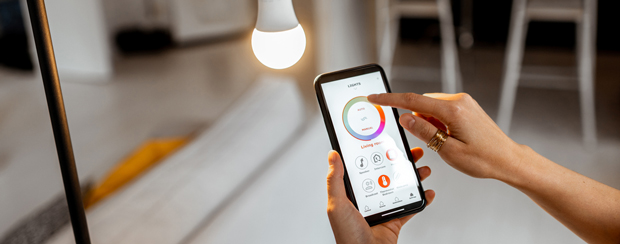The “Internet of Things” has many potential benefits for business. Yet owners of small businesses may assume these connected technologies are too expensive or complex.
On the contrary, says Steve Latham, CEO of Banyan Hills Technologies in Duluth, Georgia. While some IoT technologies are geared to larger companies, many of today’s IoT solutions are affordable and easy to implement.
What is IoT? “Essentially, it’s connecting device-based systems over the internet in order to centralize management and control,” Latham says. “That smart thermostat you use in your home? That’s IoT.”
Small businesses—due to being nimble—are often better positioned to adopt IoT technologies because they can act quickly, he adds. That said, as when adopting any new technology, it’s important to be thoughtful and strategic about how you do it, so that you’re not making costly mistakes. Here are four best practices for how small businesses can use IoT effectively:
1. Start with the lowest-hanging fruit
Start with basic IoT solutions that are affordable, easy to install and pay for themselves quickly, Latham recommends. Smart thermostats such as Ecobee or Nest and smart lighting such as Philips Hue are natural places to begin, thanks to the large energy bill savings they can generate. Smart lights, for example, allow you to control your business lighting usage through a voice assistant or a smartphone. There are a lot of options, from LED smart bulbs that can be controlled using an Alexa or Google Assistant voice assistant, to full smart-lighting hub systems such as Caseta.
Smart security cameras, such as those made by Arlo and Reolink, can be another good opportunity for businesses that need them. They can be controlled remotely through your smartphone and monitor your business 24/7, alerting you when they detect unusual motion.
2. Look beyond the basics
Once you tackle the most basic small business IoT opportunities, consider those specific to your industry or business needs. Every business, of course, is different. Companies with automotive fleets, for example, can install sensors in each vehicle to monitor delivery times and location. Companies with inventory can use IoT solutions to help them keep better tabs on it.
Passion Plans, a Raleigh, North Carolina-based architecture and construction company, began using RFID smart tags in its warehouse last year. Among other things, the tags track inventory, push the oldest products out the door first and expedite reordering. “This genius IoT invention has allowed us to lower our warehouse labor cost by 50%,” says founder Thomas Jepsen.
Next for Passion Plans? “We’re going to continue to implement additional IoT measures, including guided robots to handle more aspects of the picking and sorting,” says Jepsen. “That’ll make us even less reliant on human labor.”
“This genius IoT invention has allowed us to lower our warehouse labor cost by 50%.”
3. Secure your IoT
While IoT can make your business more dynamic and efficient, it can also pose additional security risks as you collect and store more data online. But there are ways to reduce the risks.
Reiko Feaver, a technology attorney for Culhane Meadows in Dahlonega, Georgia, recommends changing the default security settings on your Wi-Fi router and modem and taking other steps to protect your business WiFi network and prevent a data breach. Also make sure to use strong passwords and multi-factor authentication for any IoT application or software you use.
4. Practice due diligence
Stay focused on your mission and what you want IoT technologies to accomplish for your business. While some IoT technologies may reduce costs and improve operational efficiency, others may not be worth the investment of your time and money.
“It’s easy to get excited about it and start purchasing things and not have a clear vision about what you’re trying to accomplish,” Latham adds. “For small business operators, you need to get educated, think through your particular business problems, and then combine the two. How can I take advantage of IoT to get value?”
IoT technologies are only expected to get more affordable and more prevalent, so businesses are likely to have many more opportunities in the future. It’s worth considering how IoT can improve your business and evaluating which technologies are the right fit for your needs.
Print this article



0 Comments